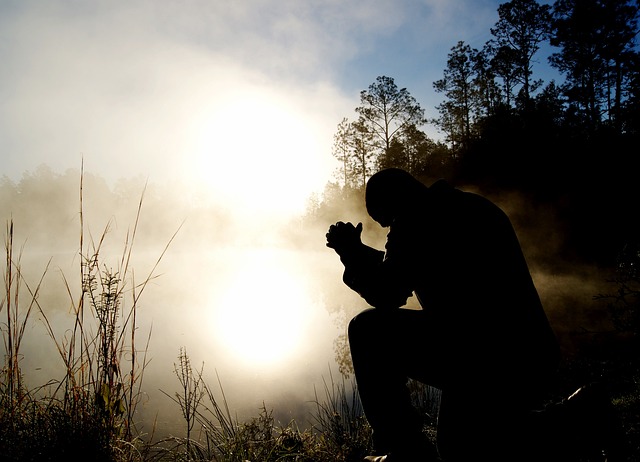| A Discipline Called Thankfulness
|
|
| Thursday, November 23, 2023 | |
If you are a little child visiting our home, you can expect a warm welcome and a horsey ride. We will gladly sit down and play your favorite game or laugh at your favorite joke. Truthfully, you can probably even expect a yes to your snack request. As I often explain to friends, it's not that we never say no, it's just that we work real hard to say yes! But there are a few things we will not tolerate: children who refuse to say please and thank you. We demand it. Insist on it. In our experience, unless you do, you end up with ungrateful brats. Sorry to be so blunt, but it’s true. Thankfulness doesn’t just happen. It’s not like the flu—some get it, and some don’t. Honestly, thankfulness is a choice, a discipline. No one becomes thankful by accident. It takes training. It's a commitment. Thankfulness is not a mystical cloud that settles over us once enough good things come our way. It's a decision we make a hundred times a day, a learned skill that comes only with practice! So, if you ask for a piece of pumpkin pie while seated at our table, your request had better come wrapped up in a "please." Otherwise, you'll be told, "I don't think I heard you." And when someone passes you the whipped cream, we'll wait to hear a thank you. Or remind you if you forget. Why the tough-guy approach to thankfulness? Because it’s that important to God. He commands it no less than 44 times in Scripture. Enough said, I hope. But since it’s Thanksgiving, could I please ask you to pass the pumpkin pie—and the whipped cream? Thank you!
|
|
| Before Billy Graham was Billy Graham
|
|
| Thursday, November 16, 2023 | |
On November 21, 1948, a tall preacher with a North Carolina drawl stood in the pulpit at the Van Orin Gospel church. It’s a small chapel in a small town surrounded by other small Illinois towns like Green Oak, Kasbeer, and Zearing. The preacher could never have known that just one year later, he would speak to 350,000 people in his Los Angeles crusade. If you visit the Van Orin Gospel church, as we did this week, you’ll see the plaque and pulpit that recall Billy Graham’s appearance. But they bring a question to mind. Before Billy Graham was Billy Graham—world-famous evangelist—what was he like? Answer: humble enough to speak at a small church in a small town. I think that's why God could and did use him. Though a fine preacher, I'm sure we've heard better. Though a compelling evangelist, God could have selected someone else. Yet God chose Dr. Graham over thousands of others. Of course, nothing in the Bible says that if we serve in small spaces, that leads to large places. Faithfulness is the goal, not famousness. Faithfulness, not bigness, is what God values. Exactly 75 years ago this week, Billy Graham stood in that rural church in that unknown town and preached the gospel. Today, there are still small towns and small churches and small spaces looking for someone small enough to serve. Are you small enough?
|
|
| Talk Like David--Here's Why!
|
|
| Thursday, November 09, 2023 | |
Sauntering off the plane in Colorado Springs, I paused to reassemble the contents of my backpack and then left the airport for lunch with a friend. Only later did I realize what I’d left behind at the airport: my iPad. Response? I started trashing myself for stupid irresponsibility. How could I have been so careless, so foolish? A nasty net of anxiety strangled my soul. For me, the iPad is much more than a tablet for surfing the web, checking email, or playing a game. I practically live on it. It's my laptop. I've written entire books on it! Tons of articles, blogs, sermons, and book chapters (still unfinished) had vanished. The thought of that loss made me nauseous. Ironically, just 24 hours previously, I'd preached a sermon based on David's Psalm 25:15, which testifies: My eyes are continually toward the Lord, for He will rescue my feet from the net. Time to heed my sermon—to talk like David. Know what I did? I prayed with a friend, quoting that verse. Next, we called the airport, filled out a form online, and waited. All afternoon, I fought off repeated blasts of anxiety with the same indestructible weapon—the Word of God: My eyes are continually toward the Lord, for He will rescue my feet from the net. While I still felt concern (and guilt), the verse brought sanity and structure to a thought life under siege. At dinner that evening, my phone rang—the airport. Remarkably, some honest soul had turned in the iPad, and we could pick it up at the baggage counter. I'm not suggesting that God will always step in and bail us out when we do foolish things. But I am saying His Word can enable us to walk through trouble in a God-honoring way—without bashing ourselves in the process. Even if God had chosen not to reunite me with that iPad, I could look back at the day and know that instead of being immobilized by a net of anxiety, I had chosen to turn my eyes toward the Lord continually. With God's enablement, I really did talk like David. Consider. To talk like David is to talk biblically. To talk biblically is to honor God. To honor God is to be blessed by God—in this life and the life to come. So, let’s start talking—like David!
P.S. Can I email you a colorful PDF graphic containing the text of this Psalm that you can print out in several sizes? Email me at Jon.gauger@moody.edu and say, “Send me that verse—I want to talk like David!”
|
|
| What Fascinates You Most?
|
|
| Thursday, November 02, 2023 | |
Are you more intrigued with earth than heaven? Let me rephrase the question: How fascinated are you with heaven? The temptation is to answer this question with what we know to be the correct Sunday School answer: "Well, of course, I'm looking forward to heaven." But there’s a foolproof way to know the truth. Your praying (and mine) tells the real story. Attend your church's prayer meeting, and what are most of the requests you hear? We pray for physical healing, well-being, jobs, houses—that sort of thing. Most of it is temporary in nature. But look at all the prayers in the New Testament. Overwhelmingly, they are not about temporal problems—the stuff we tend to focus on.
Hear me clearly—you won't hear me or Scripture suggesting you should never pray for sick people—quite the contrary. We should! I’m simply pointing out that our prayers are generally too focused on temporal things. How often do we pray for:
When was the last time your small group prayed for perseverance or endurance? When was the last time you prayed for your state's governor by name—asking for their salvation? When our fascination is heaven, we’ll pray mostly about eternal things. When our fascination is earth, we’ll pray mostly about earthly things. What fascinates YOU? Your prayers say everything.
|
|
| Just the Facts
|
|
| Thursday, October 26, 2023 | |
As the war drags on and the death toll goes up, the media is making a predictable turn. Their sympathy is shifting from Israel toward the Palestinians. Increasingly, we'll be shown tragic images of Palestinian children and women injured or killed. The not-so-subtle message will be, "If only those mean Israelis would stop attacking innocent people, stop occupying others' land, and start living in peace." Every death, every tear, every life matters—on both sides. But what you will probably not see online or on television is a clear presentation of the facts. With the kind permission of Middle East expert Dr. Charlie Dyer, I offer his summary of the facts: Fact #1 In 1947, the U.N. voted on a partition plan for the land. The Jewish people reluctantly accepted the proposal, but the Arabs did not (meaning they refused any plan that permitted a Jewish state). When the British Mandate ended in 1948, Israel declared itself a state. The Palestinians and the Arab countries on all sides immediately attacked it. When the conflict was over, Israel controlled more land than originally promised. However, no formal borders were determined--only "green lines" to mark where the different parties were when the armistice was announced.
Fact #2 The final borders were still to be determined, but no Arab countries would agree to make peace with Israel. Jordan had taken over the central part of the land and annexed it as their own. They called it the “West Bank of the Hashemite Kingdom of Jordan,” which was popularly shortened to the “West Bank.” But it was never turned into a country of Palestine by the Jordanians.
Fact #3 In 1967, Egypt, Syria, and Jordan vowed to push the Jews into the Sea. In six days, Israel defeated all three and captured the West Bank, Golan Heights, Gaza Strip, and the Sinai Peninsula. Israel offered to negotiate the return of most (though not all) land in exchange for peace. The Arabs met in Khartoum and announced their three no’s: No peace with Israel. No negotiations with Israel. No recognition of Israel.
Fact #4 In the next few years, Israel began expanding into the areas it had captured. Most of the changes in the West Bank area were designed to help provide more defensible borders and additional housing for the country as its population expanded. About a half million Israelis are now living in the West Bank area. Most of those are in bedroom communities within 5 miles of the Knesset, Israel's capital in Jerusalem, though some are scattered throughout.
Fact #5 In the late 1990s, President Clinton tried to broker peace between Israel and the Palestinians. Yitzhak Rabin and Yasser Arafat shook hands on the White House lawn, but the process quickly stalled out. Israel never agreed to give back all the West Bank because they felt the 1967 borders were indefensible in light of modern weapons. (For example, terrorists would be able to smuggle shoulder-fired missiles to within six miles of Israel's international airport.) And Arafat rejected a proposal that would have given the Palestinians most of the land.
Fact #6 In 2005, Israel unilaterally withdrew from Gaza. Two years later, Hamas took control and began using the area as a launch pad for their attacks on Israel. Hamas's charter calls for the destruction of Israel and the establishment of an Islamic Caliphate that extends from the Jordan River to the Mediterranean. That’s the basis for what’s happening now.
There you have it—a factual history of the Arab-Israeli conflict. But for the believer, knowing is just the beginning.
What we can’t do—is nothing.
P.S. Listen to Moody Radio's one-hour special, After the Attack on Israel, when you go to: https://www.moodyradio.org/specials
|
|
| Records per page First Prev 4 5 6 7 8 9 10 11 12 13 of 129 Next Last | |
 Jon Gauger Jon Gauger |
|||||||||||||||
| Thursday Thought | |||||||||||||||
|
|
|||||||||||||||
Recent Posts
|

.jpg)


.jpg)